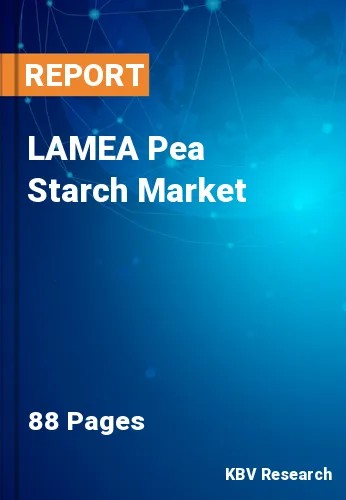The Latin America, Middle East and Africa Pea Starch Market would witness market growth of 9.0% CAGR during the forecast period (2022-2028).
Manufacturers nowadays place a greater emphasis on research and development as active consumers expect a greater ability to monitor their intake despite their hectic schedules. Most health-conscious consumers search for products that will benefit them while incorporating low-glycemic-index foods and substitutes into their diets. Pea starch helps people maintain sustained energy while also helping them manage their blood sugar levels.
The product has numerous applications in nutraceuticals, functional foods, geriatric and therapeutic nutrition, sports nutrition, and weight management. Pea starch, which is easier to digest than items that contain lactose, is preferred by consumers who are lactose intolerant. As a result, there has been a rise in the demand for goods containing pea starch among those who are lactose intolerant. Additionally, modifications in consumer consumption habits support the expansion of the market.
For instance, due to its anti-allergic effects and low-calorie content, pea starch consumption is predicted to rise significantly among health-conscious customers. Therefore, this element has a considerable impact on the expansion of the market. Additionally, the market's growth is boosted by creating new goods with enhanced advantages and tastes, as well as strong marketing support.
Brazil is one of Latin America's economies that is expanding the fastest. Consequently, pea starch's market value is projected to increase over the future years, particularly among the regional vegetarian and vegan communities. The majority of local pea exports and production are within Argentina's authority. According to the Food and Agriculture Organization (FAO) of the United Nations, the primary chickpea-growing regions are the province of Cordoba and the northwest of Argentina. The vegan movement is growing in Argentina's populace due to the successful retail distribution of plant-based goods and the broad knowledge of pea starch's benefits.
The Brazil market dominated the LAMEA Pea Starch Market by Country in 2021; thereby, achieving a market value of $4,077.7 Thousands by 2028. The Argentina market is showcasing a CAGR of 9.6% during (2022 - 2028). Additionally, The UAE market would register a CAGR of 8.7% during (2022 - 2028).
Based on Source, the market is segmented into Inorganic, and Organic. Based on Grade, the market is segmented into Food, Feed, and Industrial. Based on Product Type, the market is segmented into Native, and Modified. Based on Function, the market is segmented into Binding & Thickening, Texturizing, Gelling, Fil Forming, and Others. Based on Application, the market is segmented into Food & Beverages, Industrial, Pet Food, and Feed. Based on countries, the market is segmented into Brazil, Argentina, UAE, Saudi Arabia, South Africa, Nigeria, and Rest of LAMEA.
Free Valuable Insights: The Worldwide Pea Starch Market is Projected to reach USD 222.5 Million by 2028, at a CAGR of 6.1%
The market research report covers the analysis of key stake holders of the market. Key companies profiled in the report include Ingredion Incorporated, Roquette Freres SA, Emsland Group, Dakota Dry Bean, Inc., The Scoular Company, Axiom Foods, Inc., Yantai Shuangta Food co., LTD, PURIS, NutriPea LP and Organicway Inc.
By Source
By Grade
By Product Type
By Function
By Application
By Country
Our team of dedicated experts can provide you with attractive expansion opportunities for your business.

